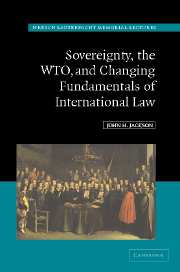Book contents
- Frontmatter
- Contents
- Preface
- Table of statutes and regulations
- Table of cases
- Part I Challenges to fundamental assumptions of international law
- Part II The WTO
- Part III The search for solutions
- 6 Policy analytical approaches and thought experiments
- 7 Illustrative applications
- 8 Perspectives and implications: some conclusions
- Appendix: Outline of the Uruguay Round treaty establishing the World Trade Organization
- Notes
- Index
6 - Policy analytical approaches and thought experiments
Published online by Cambridge University Press: 29 March 2011
- Frontmatter
- Contents
- Preface
- Table of statutes and regulations
- Table of cases
- Part I Challenges to fundamental assumptions of international law
- Part II The WTO
- Part III The search for solutions
- 6 Policy analytical approaches and thought experiments
- 7 Illustrative applications
- 8 Perspectives and implications: some conclusions
- Appendix: Outline of the Uruguay Round treaty establishing the World Trade Organization
- Notes
- Index
Summary
What are the objects and purposes of the DSU, and the WTO more generally, that are relevant …? The most relevant in our view are those which relate to the creation of market conditions conducive to individual economic activity in national and global markets and to the provision of a secure and predictable multilateral trading system.
… [I]t would be entirely wrong to consider that the position of individuals is of no relevance to the GATT/WTO legal matrix.
WTO first-level panel, Section 301 case (2000)Introduction to Part III and Chapter 6
Part I (consisting of chapters 1, 2 and 3) explored the problems and challenges which are impacting the fundamentals of international law and international economic law. Part II (Chapters 4 and 5) explored the GATT/WTO institution partly as a case study, to provide detail of actual practices affecting the questions raised in Part I.
This last part (Part III, containing chapters 6, 7, and 8), now shifts the viewpoint from the past and the present, more towards the future. The objective is to present a few ideas about how the international law system generally, and the economic part of it in particular, may respond to the many challenges which they face. Needless to say, these ideas are neither a full inventory of possible suggestions, nor do they comprise any particularly elaborate all-embracing simple theory as a definitive road map for the future.
- Type
- Chapter
- Information
- Publisher: Cambridge University PressPrint publication year: 2006

